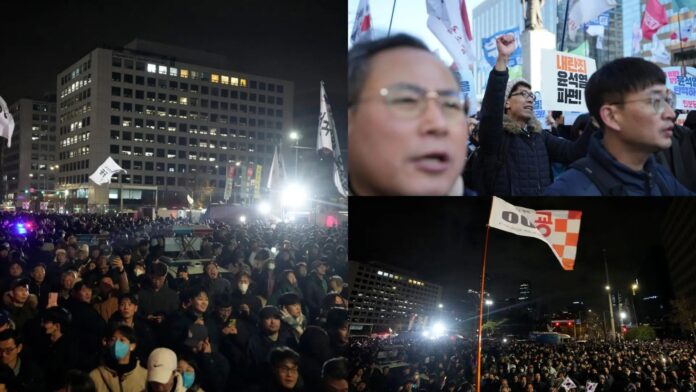South Korea experienced a night of dramatic political upheaval on Tuesday as President Yoon Suk Yeol declared martial law, only for it to be swiftly overturned by the National Assembly within hours. The imposition of martial law, which marked the first such move in South Korea since 1980, sparked outrage across the country, leading to mass protests, emergency parliamentary actions, and international concern.
In an unexpected late-night address, President Yoon announced martial law, citing the need to eliminate “anti-state” and “pro-North Korean forces.” This declaration immediately ignited controversy and public unrest, as thousands of South Koreans gathered outside the National Assembly in Seoul to voice their discontent. The martial law provisions were extensive, including the suspension of political activities, authorization for arrests without warrants, and restrictions on dissent, including bans on “fake news” and “manipulating public opinion.” The swift imposition of these measures triggered immediate condemnation from opposition parties, civil society, and the international community.
As news of the martial law spread, protesters flooded the streets near the National Assembly, chanting slogans like “Withdraw emergency martial law!” and “Arrest Yoon Suk Yeol!” The atmosphere was tense, with demonstrators clashing with security forces in attempts to breach the parliamentary complex. Footage shared on social media showed police and soldiers guarding the entrance of the Assembly, while armored vehicles and armed members of South Korea’s martial command forces were seen approaching the Parliament.
Despite the heavy security presence, the political backlash was swift. Inside the Assembly, opposition leaders from the Democratic Party denounced the martial law as an unconstitutional attack on democratic values. Many accused President Yoon of orchestrating a political coup to consolidate power. In response, the Assembly convened an emergency late-night session to address the crisis. In a rare show of unity, 190 out of 300 lawmakers from both the ruling and opposition parties unanimously voted to reject the martial law declaration, effectively invalidating it within hours of its announcement.
The vote was a decisive blow to President Yoon’s authority. The National Assembly Speaker promptly declared the martial law invalid, leading to the withdrawal of troops that had earlier entered the parliamentary premises. Outside the Assembly, jubilant protesters celebrated the decision, chanting “We won,” clapping, and hugging each other as news of the rollback spread. The swift action by Parliament underscored the strength of South Korea’s democratic institutions, even in the face of such unprecedented challenges.
Under South Korean law, if the National Assembly demands the lifting of martial law by a majority vote, the president is legally obligated to comply. Faced with overwhelming political pressure, President Yoon’s own People Power Party (PPP) urged him to lift the decree. The president had little choice but to announce the rollback of martial law, marking a significant political defeat.
The international community also expressed concerns over the dramatic developments in South Korea. US Deputy Secretary of State Kurt Campbell conveyed “grave concern” over President Yoon’s decision, emphasizing the importance of peacefully resolving political disputes and upholding the rule of law. The declaration of martial law drew particular scrutiny given the lack of any imminent security threat to justify such extreme measures.
Former South Korean Foreign Minister Kyung-wha Kang was among those who condemned the move. She described the declaration as “shocking,” stating, “Nothing in the country’s circumstances justified such a move.” Kang added that the martial law was not only unjustified but also lacked proper procedural oversight, which “further weakened” President Yoon’s authority. She expressed relief that Parliament acted swiftly to reject the measure and restore stability.
The chaotic hours following the martial law declaration were further underscored by reports of soldiers entering the Parliament building through smashed windows, with videos of the incident quickly going viral online. The sudden escalation and subsequent withdrawal of martial law also had immediate economic repercussions, with the Korean won experiencing a sharp drop against the US dollar as investors reacted to the unfolding crisis.
The political crisis highlights the ongoing challenges faced by President Yoon since taking office in 2022. His administration has struggled to advance its agenda in a parliament dominated by opposition parties, and the failed martial law attempt has only deepened the divide between the government and the opposition. The dramatic events of Tuesday night underscored the volatility of South Korea’s political landscape and the fragility of President Yoon’s hold on power.
In the end, the swift overturn of martial law served as a testament to the resilience of South Korea’s democratic institutions and the power of public dissent. The rapid mobilization of lawmakers, the widespread public protests, and the ultimate rejection of martial law all reflected a nation unwilling to compromise on its hard-earned democratic freedoms. As President Yoon faces mounting criticism, the events of Tuesday night are likely to have lasting implications for his presidency and for South Korea’s political future.

